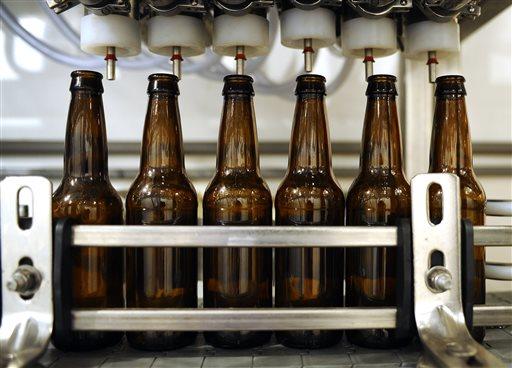
Section Branding
Header Content
Georgia Craft Breweries Want To Sell You Beer
Primary Content

Craft beer breweries in Georgia are fighting to get their beer directly to consumers.
Distributors, called Wholesalers, are responsible for getting beer from the brewery to the market. Now brewers are saying they need more control.
Orpheus Brewing in midtown Atlanta has an impressive outfit. They are launching a dark bitter Ale, something Founder Andrew Lorber wants to sell to customers.
“For us, it’s very important to sell some beer at the brewery to the people who walk in," says Lorber.
He can’t do that because the laws in Georgia require him to sell the beer to his Wholesaler - United Distributors. The only way a brewer in Georgia can sell directly to consumers is through tour packages. You pay a fee at the brewery, and you get beer samples with a tour.
But the Wholesaler is important because it gives Lorber’s product access to the marketplace. Martin Smith is Spokesman for the Georgia Beer Wholesalers Association. He says the Wholesaler ensures brands of all sizes get sold.
“Go take a walk at the grocery store down the soft drink aisle, there’s going to be about two brands: Coke and Pepsi," says Smith. "But if you go down the beer aisle, you realize very quickly, that any product from any producer can reach those shelves.”
This three-tier system was established after prohibition. Wholesalers came between beer producers and retailers to regulate product flow and to make sure brewers followed the rules.
But Nancy Palmer, Executive Director of the Georgia Craft Brewer’s Guild, says Wholesalers have ultimate authority over the brewers’ product.
“The default is that the relationship is one in which the small brand does not have very much power and the Wholesaler has a lot," says Palmer.
Last year, a Senate bill sponsored by Senator Hunter Hill allowed brewers to sell different tour packages. Then in September, the Department of Revenue rescinded that power.
This January, Wholesalers and brewers reached an agreement, once again allowing breweries to price different tours. But the deal didn’t solve the main problem, which both sides say is a lack of transparency between brewer and wholesaler. Palmer says a way to gain clarity is to give brewers more decisions, like how beer gets distributed on the Wholesalers’ trucks.
“The question is about whether or not they should have a choice in being on those trucks," says Palmer. "Any whether or not they should one day maybe be able get off the truck if they want to or move to a different truck.”
Smith of the Wholesaler’s Association says they want the breweries to thrive, but he worries the current system will get uprooted as brewers earn more privileges.
“Because it’s a system that has been so successful in allowing for market access for all markets for any sized brewer, our concern is that if you adjust any of that, you need to do it in a cautious way," says Smith.
How do you predict the effect of allowing brewers to sell straight to customers? Attorney Max Hess has been practicing law in the beverage alcohol field for 25 years. He says Georgia went through a similar process with wine in the 1980s. The state passed a law that allowed a farm winery to sell directly to consumers.
“That slight change allowed us to have regional tourism, allowed us to develop new brands, and to promote our own economy in terms of having lots of new start-ups producing wine, and didn’t compromise in any noticeable way the things the three-tier system is supposed to do," says Hess.
Palmer says a barrel of craft beer in another state is on average two and a half times as profitable as in Georgia. She thinks the state will miss out on a huge economic boon if it doesn’t ease its’ alcohol regulations.
“The laws are so restrictive that Georgia is no longer an attractive place to do business if your small business is alcohol manufacturing," Palmer says. " But ultimately it’s just about whether or not Georgia wants to participate in this tremendous and huge growing industry, or if we don’t.”
At Orpheus, Lorber is sampling out some new varieties. His dream, he says, is to one day hand his neighbors a pint over the counter.
